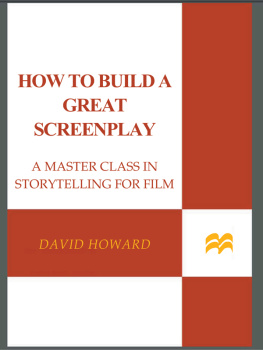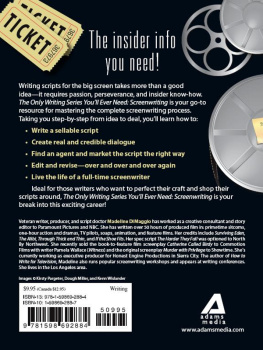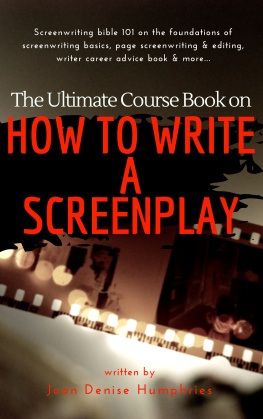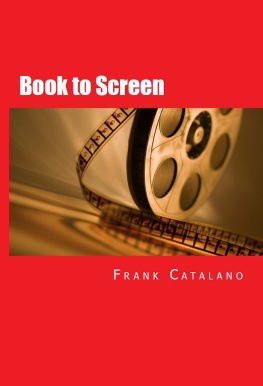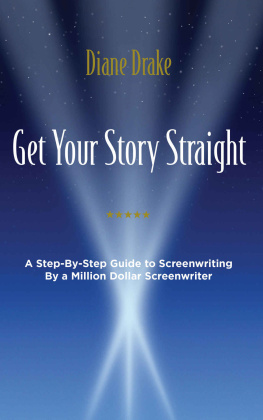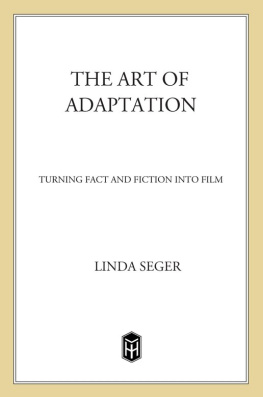Screen Adaptation: Beyond the Basics
Once you understand the basics of screenwriting, ideas for your next screenplay are everywhere. Whether it comes from a favorite childrens book, a summer novel you discover accidentally, a news story that catches your imagination, or a chapter from your own lifeadvanced screenwriting strategies should now guide you through your first adaptation. In Screen Adaptation: Beyond the Basics, award-winning screenwriter Eric R. Williams uses examples from award-winning screenplays to explain new storytelling techniques. His real-world examples illustrate a range of advanced approachesincluding new ways to identify and craft tension, how to reimagine structure and character, and how to strengthen emotional depth in your characters and in the audience. This book teaches readers new ways to engage with source material in order to make successful adaptation decisions, regardless of the source material.
The book offers:
Three detailed examples of award-winning adaptations by the author, including the complete short story and final scripts used in the Voices from the Heartland project;
Breakout boxes highlighting modern and historical adaptations and providing examples for each concept discussed in the book;
More than fifty charts providing easy-to-use visual representations of complex concepts;
New screenwriting techniques developed by the author, including the Triangle of Knowledge, the Storytellers Parallax, and the idea of Super Genres as part of a Screenwriters Taxonomy.
Eric R. Williams screenplays have received the Best New Work award from the Writers Guild of America, an Emmy Award from the National Academy of Television Arts and Sciences, and the Award for Individual Excellence in Screenwriting from the Ohio Arts Council. He has adapted novels by Luis Urrea (Across the Wire), Bill Littlefield (Prospect), and Guillermo Fadanelli (The Other Face of Rock Hudson). His latest projects include an adaptation of the anthology Voices from the Heartland into a thirteen-part television series. Eric received his MFA from Columbia Universitys School of Film. He currently teaches at Ohio University, where he has received the University Professor Award for Excellence in Teaching.
You can learn more by visiting his website: www.WilliamsOnStory.com.
Screen Adaptation: Beyond the Basics
Techniques for Adapting Books, Comics, and Real-Life Stories into Screenplays
Eric R. Williams
with illustrations by Tyler Ayres
First published 2018
by Routledge
711 Third Avenue, New York, NY 10017
and by Routledge
2 Park Square, Milton Park, Abingdon, Oxon OX14 4RN
Routledge is an imprint of the Taylor & Francis Group, an informa business
2018 Taylor & Francis
The right of Eric R. Williams to be identified as the author of this work has been asserted by him in accordance with sections 77 and 78 of the Copyright, Designs and Patents Act 1988.
All rights reserved. No part of this book may be reprinted or reproduced or utilized in any form or by any electronic, mechanical, or other means, now known or hereafter invented, including photocopying and recording, or in any information storage or retrieval system, without permission in writing from the publishers.
Trademark notice: Product or corporate names may be trademarks or registered trademarks, and are used only for identification and explanation without intent to infringe.
Library of Congress Cataloging in Publication Data
A catalog record for this book has been requested
ISBN: 978-1-138-94885-3 (hbk)
ISBN: 978-1-138-94886-0 (pbk)
ISBN: 978-1-315-66941-0 (ebk)
Typeset in TrumpMediaeval
by Wearset Ltd, Boldon, Tyne and Wear
Dedication
This book is dedicated to my parentsStu and Carole. On lazy Sunday afternoons, my father introduced me to the world of film, and taught me how to tell good stories by always telling good stories himself. My mother instilled in me a love for reading and writing, and taught me how to think things through and explain them. Thank you both with all my heart.
Contents
As a professor and a professional screenwriter, I am torn and strengthened by having my feet in both worlds. A good screenwriterespecially one undertaking an adaptationneeds to be able to collaborate with other writers, producers, and directors about story, structure, character, and thematic interpretations. Students can be as demanding as producers. A professor must teach these practices to young screenwriters. Often, students (and producers) believe that screenwriting is an act accomplished alone. It is not. Screenwriting is a dance. It can be rehearsed, discussed, presented, experienced, and revamped. Of course, you can dance by yourself (many do), but the most rewarding dances involve more than one person. When hired, a screenwriter needs to understand the expectations of the producer, of the audience, and of himself (and writing partner). The same is true for a student, with the teacher standing in as producer, mentor, and audience.
As a writer, I frequently isolate certain elements of the adaptation process so that the script can be examined under different lenses. I discuss these elements with my students too. The process is very similar to going to the ophthalmologist. Neophyte screenwriters expect to work in isolation until they turn in their screenplay for the professor to grade itor the producer to judge itin its entirety. They want to know that their work is good, and what if anything will make the screenplay better. They look at their work holistically, like a cake, as if the answer might be: add more frosting. This is an amateur approach.
Rather, think of the ophthalmologist: placing different optical variants in front of your eyes, asking Do these make your vision better or worse? You answer. And a new lens snaps into place: Better or worse? And so it goes as your doctor tests each variant in your eye until, eventually, the device is removed and you are prescribed a set of glasses. Each aspect of screenwriting is its own set of variants. When critiquing a script, the question should not be, Is it any good? but rather, Will an adjustment to the dialogue make it better or worse? Character: Better or worse? Structural adjustment, thematic refinement, or a change to genre expectations: Better or worse? These are the questions I prefer to discuss with a producer a colleague myself, when I write.
Adaptations are a tough racket, but I believe in them. They are tough because, unless you personally own the rights to the underlying material, writing them requires doing work for hire. If the script isnt produced, you cant shop the material yourself. Its a dead project (as far as the screenwriter is concerned). Yet, I believe in them because an adaptation gets to the heart of the collaborative process. The screenwriter really gets to roll up his or her sleeves and mull over an idea with producers, directors, and sometimes the original writer. I find this incredibly rewarding. Some of my best work has come through adaptation. Others, I believe, would say the same. In 2005, the Writers Guild of America surveyed its members, asking them to determine the 101 Best Screenplays of all time. More than half of the screenplays chosen for this honor are adaptations; including five of the top ten, three of the top five, and both of the top two.


